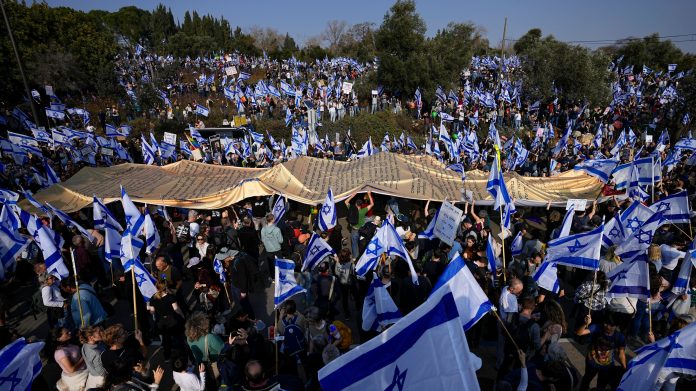A months-long wave of anti-regime protests, sparked by prime minister Benjamin Netanyahu’s far-right administration and its contentious policies, has prompted warnings of a “worrying” security situation across the occupied territories from Israeli opposition leader Benny Gantz.
Former minister of military affairs Benny Gantz urged the need to “avoid unilateral moves” following a meeting with Israeli military Chief of Staff Herzi Halevi on Sunday.”
“The security situation is very concerning and demands attention and tactical choices on many levels. Before the bill is passed, the prime minister needs to call a security cabinet meeting to discuss what the army [overhaul] legislation means.
The same, continued Gantz, applies to the requirement to call a meeting of the foreign affairs and military committee. “Tonight’s meeting highlighted the importance of avoiding unilateral actions even more.”
read more: Israel political scene devalues daily, overshadow with discrepancy
This comes as 10,000 reserve soldiers have threatened to stop serving voluntarily if Netanyahu’s radical government signs the divisive judicial reform bill into law.
The reservists, who include 235 fighter pilots, 173 drone operators, and 85 commando soldiers, declared in a statement that “we all share a responsibility to stop the deep division, polarization, and rift among the people.”
The signatories cautioned that acting in an “unreasonable manner” would undermine their willingness to “risk their lives” and “force” them to discontinue their voluntary reserve services.
The goal of the so-called “judicial overhaul” plan is to deny the Israeli Supreme Court the authority to overturn legislative decisions made by the ruling party. Additionally, it aims to give the Israeli cabinet more control over the selection of judges for the court.
In a last-ditch show of force to stop the contentious judicial reform plan, tens of thousands of Israeli settlers marched into al-Quds on Sunday and more protesters took to the streets in Tel Aviv.
In the days leading up to the discussion that started on Sunday and the parliamentary vote on Monday that could result in the passage of a significant portion of the proposals into law, protests have intensified.
Supporters of the overhaul plan claim that it will put an end to decades of judicial overreach, while opponents claim that it will do away with crucial safeguards against the exercise of political power.
Additionally, critics claim that Netanyahu, who is facing several counts of corruption-related charges, is attempting to use the scheme to overturn potential judgments against him.
Up until the cabinet decides to abandon the overhaul plan, protesters have vowed to continue holding enormous rallies.
Netanyahu announced a halt to his efforts to get the plan approved by the Knesset (parliament) in late March as a result of ferocious protests and a wave of widespread industrial actions in support of those protests.
The new legislation, according to pro-Netanyahu legislators, would be a much softer version of earlier bills that sought to almost completely curtail the Supreme Court’s ability to overturn executive decisions.
However, the opposition claims that the new bill would still leave room for corruption.
Gali Baharav-Miara, the attorney general of the government, has charged that Netanyahu is advocating the reforms in an “illegal” manner. She pointed out that the prime minister is attempting to move forward with the plan in light of his protracted corruption trial, in which he is charged with fraud and breach of trust.













